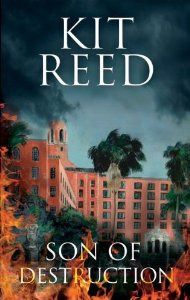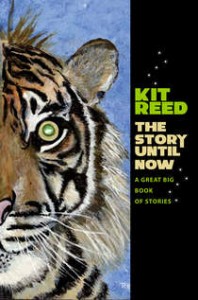5 Questions With . . . Resident Writer Kit Reed on New Books

In this issue of the Wesleyan Connection, we speak with Kit Reed, resident writer in the English Department. Reed recently published two new books, Son of Destruction (Severn House), in which a reporter searches for his father and winds up investigating cases of human spontaneous combustion; and The Story Until Now (Wesleyan University Press), a rich collection of 35 stories that displays the range and complexity of her work.
In a recent review of Reed’s two books in The New York Times, thriller writer Chelsea Cain wrote: “Reed finds humanity in the most fantastic places. She does it without pretension. And she does it with a sense of humor and no apologies. In my Museum of American Writers, I’d have a statue of Kit Reed in the lobby.”
Q: You’ve described yourself as “transgenred.” Would you talk about that?
A: Mother Isn’t Dead She’s Only Sleeping, my first novel, was a comic novel, set in Fort Jude, Florida. At War As Children, my second, was elegiac; both were drawn immediately from life. The third, The Better Part, was drawn from life but included one imagined detail: The narrator was the daughter of a man who ran the world’s largest correctional school for troubled teens. I’ve always been interested in dystopias, which makes some editors believe it’s SF—that is, speculative fiction, where writers can expand their imaginations beyond the seen world. The novels have, variously, been marketed accordingly, and the short fiction goes where editors who like a particular story take them, which means they’ve been in The Yale Review, The Magazine of Fantasy and Science Fiction, The Kenyon Review, Asimov’s SF, Missouri Review, New Haven Review, and… and… You get the idea. And I’m described as a “literary” writer (The Norton Anthology)!
George Saunders and Karen Russell came that route somewhat later. Editorial territory is less hostile now, and few reviewers have picked up on the fact that they are writing (shhh) SF, but that’s what they’re doing. It’s a friendlier climate for, OK, works that expand the imagination.
Literary, sometimes comic, always reality-based, but sometimes SF, oh right, and a couple of psychothrillers in the ’90s. In short, I’m “transgenred” because I don’t belong anywhere.
Q: What inspired your latest novel?

A: A spectacular instance of spontaneous human combustion in St. Petersburg, Florida. Google images of Mary Reeser, who went up in flames in her recliner in 1957 and you’ll see. The case is famous because although the FBI has theories, nobody has ever figured out how one woman alone, with no open flames in the room and no apparent combustibles, went up like a torch. There was a second in St. Pete in the ’60s; she didn’t get as much attention because, like Reeser, she wasn’t local. There have been spontaneous human combustions reported all over the world—most recently, in February ‘13, a guy went up in smoke in Tulsa.
What drew me to Florida, where I was in middle school and spent two years after college working for the St. Petersburg Times, was an idea. When outsiders incinerate, the local society tsk-tsks and moves on, because they weren’t, OK, people like us. What would happen if it happened to a dowager empress type, social leader, founding daughter of the exclusive Fort Jude Club? Son of Destruction is, rather, about what happens when outside events disrupt lives, blowing apart a tight, essentially closed, society.
Q: You’ve had a long writing career. How did you choose the stories to be included in The Story Until Now?
A: I went for my favorites. I didn’t want to stick readers with the so-called “classics” written back in the day. I’m happy to report that of the 35 stories, at least a third have been written and published in the last ten years—a couple in 2012 and two in 2013.

Q:: How do you know you have an idea for a story or a novel?
A: I hear it coming. It’s either something I know I can do in a few weeks, ergo a short story, or an idea that demands more space and time. Then I’m heading into a novel.
Q: What have you read lately that you’ve liked and why?
A: In the past year, and I read a lot, I’ve read two standouts. Peter Heller’s The Dog Stars, gorgeous writing, great setting, fabulous supporting character named Bangley, who’s a munitions expert, funny, intransigent guy, particularly useful in solitary siege situations.
American Dream Machine by Matthew Specktor, whose father is a senior agent at CAA. An insider’s tragicomic look into the lives of two generations in the territory where movies, careers—and lives—are made or broken. He’s a smart, funny writer. I just finished the book and I love it.
Note that I’ve used the word “funny” in a couple of places above. Life can, at times, be so bleak that laughing is how you survive it. Think of me as working like the actor cast as Hamlet, who has to strut and fret or whatever with one foot stuck in a trash can. How can you not laugh?

